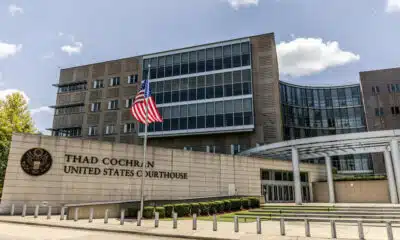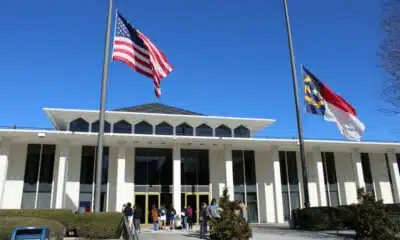Mississippi Today
On this day in 1965
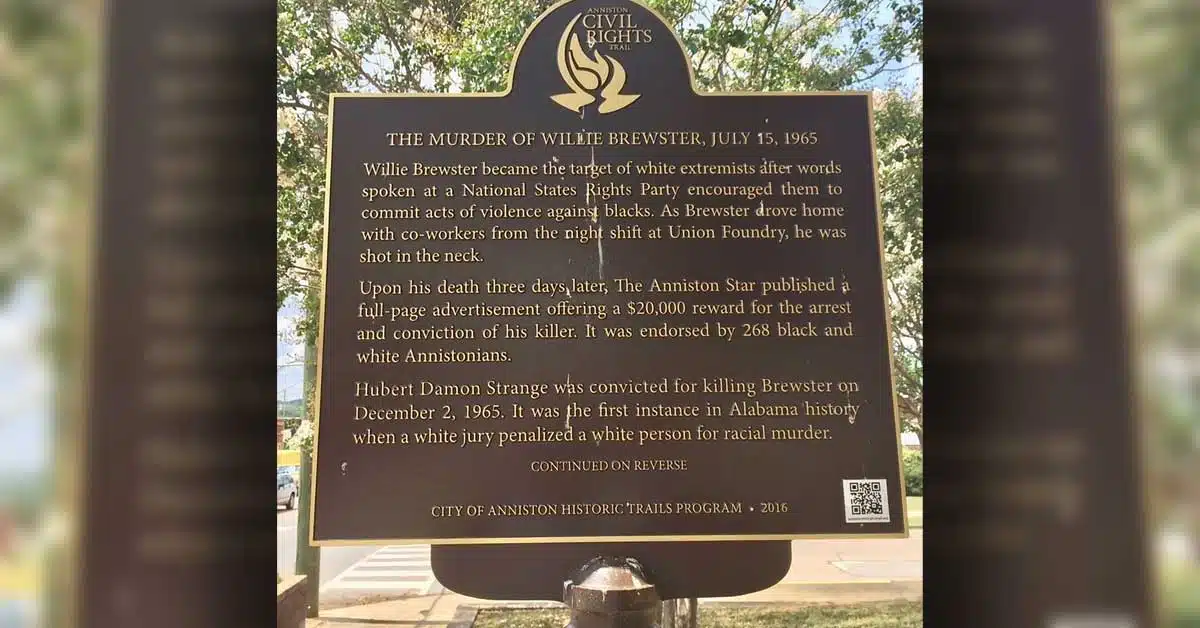

JULY 18, 1965
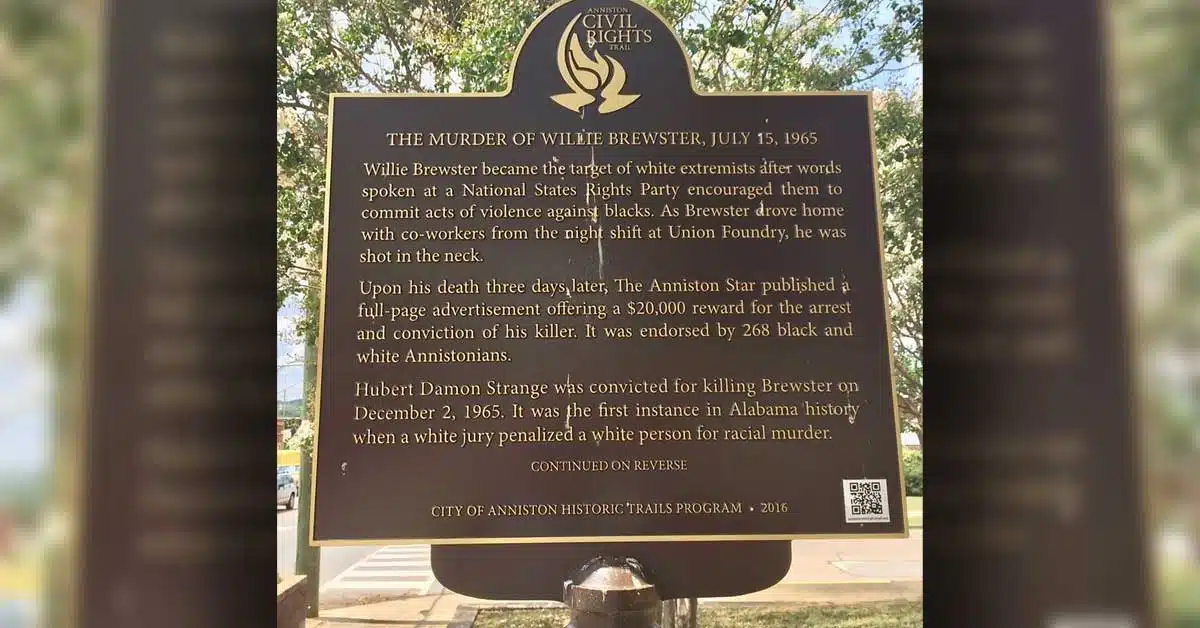
Willie Brewster was heading home after working at a pipe foundry near Anniston, Alabama, when he was shot and killed by three white men. Back home, his two children and his wife, Lestine, now pregnant, were waiting for him. Shots struck his spine as the men passed.
The men belonged to the National States Rights Party, a violent neo-Nazi group whose members had been involved in church bombings and killings of African Americans. The men had just heard the group’s Connie Lynch declare, “If it takes killing to get the Negroes out of the white man’s streets and to protect our constitutional rights, then I say, yes, kill them!” They did as he told them.
Months later, jurors sentenced Hubert Damon Strange to 10 years in prison for killing Brewster. It was believed to be the first case in Alabama where an all-white jury convicted a white man of killing a Black man in Alabama. He never served time behind bars. Instead, while he was out on bond, he was killed in a bar fight.
This article first appeared on Mississippi Today and is republished here under a Creative Commons license.
Did you miss our previous article…
https://www.biloxinewsevents.com/?p=376254
Mississippi Today
Mississippi Delta funeral home marks century of service
MARKS – In 1925, a body hung, suspended in a village square outside Lambert, Mississippi. The man, whose name has been lost to time, was the victim of a lynching – one of several hundred Black people killed at the hands of white mobs in the Mississippi Delta in the first half of the 20th century.
Local Black sharecroppers were afraid to cut the man down. But Silas Kelly wasn’t. The wealthy Black landowner took the body to his home to prepare for burial. The idea for Delta Burial Corp. was born.
Now 100 years later, the funeral home’s mission is the same: provide dignified burials for locals in the Mississippi Delta, regardless of status and income.
Without help from nearby banks, Kelly and his Black colleagues in business and farming pooled their money to form a company. To this day, it remains a business managed entirely by Black stockholders.
Black mourners who sought a standard burial previously had to visit white funeral homes that subjected them to subpar service and inflated costs.
In an oral history, Greenville native and funeral home director Beatrice Huddleston recounted how sharecropper neighbors were often forced to tear plywood from their shacks for a makeshift coffin.
With local wages in mind, Delta Burial offered services on a sliding scale or with small monthly premiums throughout the Jim Crow era, the AIDS epidemic, floods and wars. Its leaders have provided sanctuary for civil rights organizers, hosted burial society galas and organized countless celebrations of life.
The funeral home’s longtime mortician, Woodrow “Champ” Jackson, embalmed Emmett Till’s body at his previous job – and assisted in the transport of the teenager’s body to Chicago. Jackson mentored several morticians who have passed through the Marks funeral home’s screened door.
Today, much of Delta Burial’s clientele still comes from Quitman County, along with southern Tunica County, Coahoma County and Tallahatchie County. Through the business’ inclusion in the National Mortuary program, the funeral home prepares bodies from as far as Los Angeles, Chicago, New York and even East Africa.
This month, Delta Burial Corp. celebrates its 100th year serving Mississippi Delta families. Manuel Killibrew, the corporation’s latest president, credits the firm’s longevity with “reaching out to the community” and “good service.”
A community undertaker
When his father fell ill, Killibrew assisted him on house calls to collect burial insurance. He grew accustomed to his father’s route and soon took it over. He came to appreciate the conversations in neighbors’ living rooms. Every month, he would bring his report and cash to what 55 years later would be his office.
After receiving a large insurance payout from a car accident, he bought his first two shares in the company. He later became general manager and president.
Some aspects of the business haven’t changed. He still makes house calls, visiting grieving families and discussing funeral packages. He still has to negotiate with pastors to keep their sermons and services short enough to make the reserved time at the cemetery.
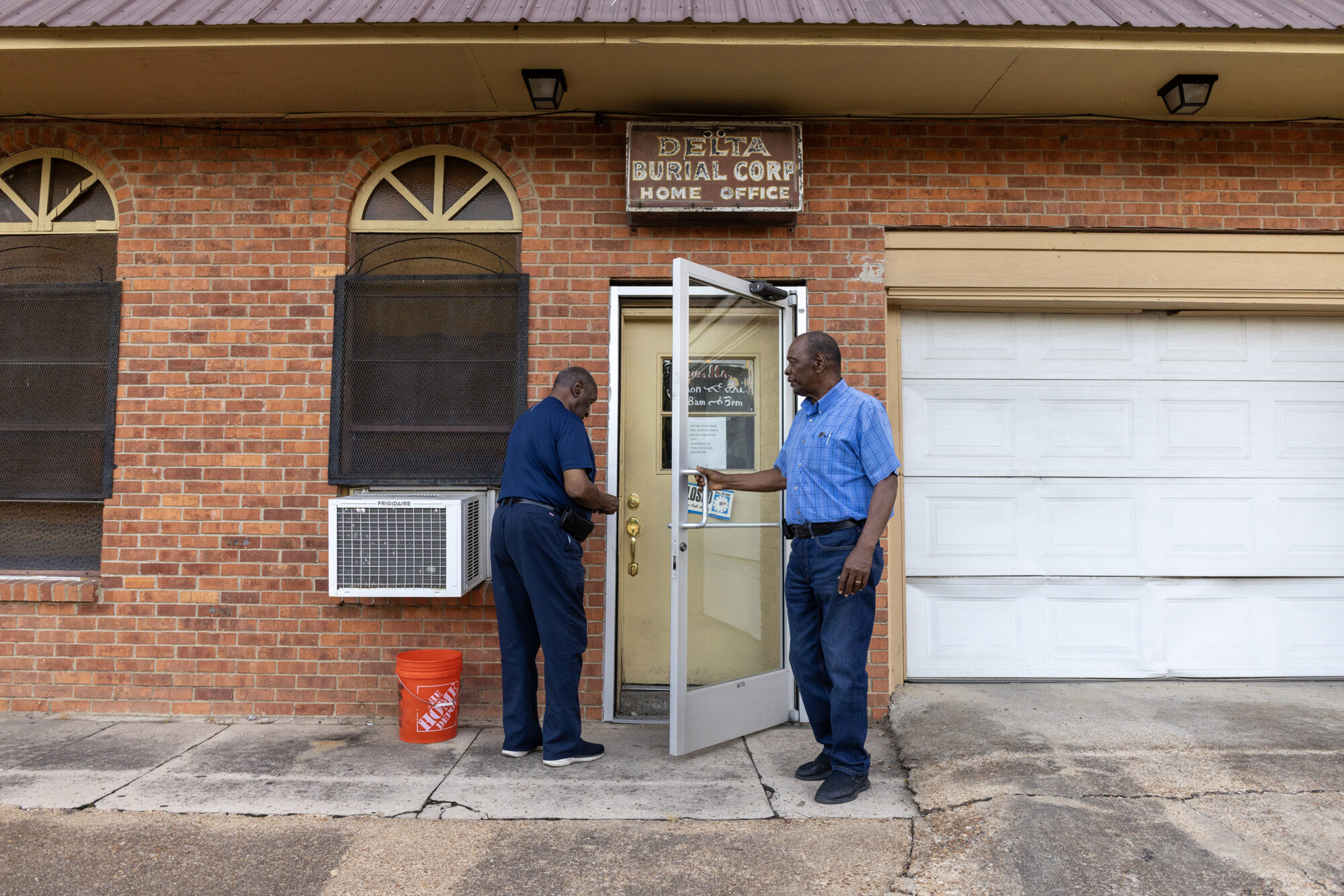
While the same sales agents for casket companies and vaults still call Killibrew, they now all work for the same company. Many of his suppliers have consolidated, which means higher prices. Memphis, Tennessee, and the Mississippi towns of Canton and Batesville used to have their own casket factories.
Killibrew, who says integrity and fairness are guiding principles, welcomes regulations in the death care industry.
State law requires funeral home directors to show families the actual costs of caskets, vaults, embalming and other services and products. The directors must deposit 85% of money from prearranged funeral contracts into a trust. The money is only released to the funeral home after the service is completed.
At Delta Burial, families have been shown actual prices of products and services as long as Killibrew has led the company.
He said customers often ask for credit so they can pay expenses over time.
“But we don’t turn anybody down,” Killibrew said. “Some bring money every month. Some don’t. But I know we are blessed. We were founded on a religious foundation.”
“You make more on one family and lose more on another. So you still hang on,” he added.
He said a majority of Delta Burial funerals cost $3,000 to $6,000, which is well below the state average of roughly $8,000. He said he has only sold a $10,000 funeral roughly four or five times in his career.
Families are selecting cremation more than in the past for financial reasons. Even Mississippi, which has the lowest cremation rate in the country, saw a 31% increase in cremations from 2019 to 2023, according to the Mississippi State Department of Health.
In his garage, between two Mercedes-Benz hearses, Killibrew pointed to a 4-foot stack of wooden box slats. The most affordable option available for a traditional burial is for his team to assemble a wooden coffin on-site.
“But some still like the show,” he said.
Some families are willing to pay a couple hundred to a thousand extra for a horse-drawn carriage procession. Some opt to rent the Cadillac hearse, which he recently bought in Atlanta for $134,000.
The ancestors
Delta Burial leadership and staff played a discrete role in the civil rights movement. For many morticians who were already embedded in the community, activism was an extension of their service.
On Feb. 2, 1962, former Delta Burial President John Melchor was sentenced to six months in jail for organizing a boycott against white business owners. Two other nearby funeral home directors were sentenced, too. Melchor’s bond was set at $1,500, which would be roughly $16,000 today.
Melchor also hosted the Rev. Martin Luther King Jr. at his home in Clarksdale. The two spoke on the telephone frequently and strategized on how to register Black voters in the Delta.
“Until they are stopped, our money, our tax money, will go to the White Citizens’ Council. To be free, you and I must pay and give,” Melchor wrote in a letter to Mississippi pastors and community organizers dated Feb. 14, 1961.
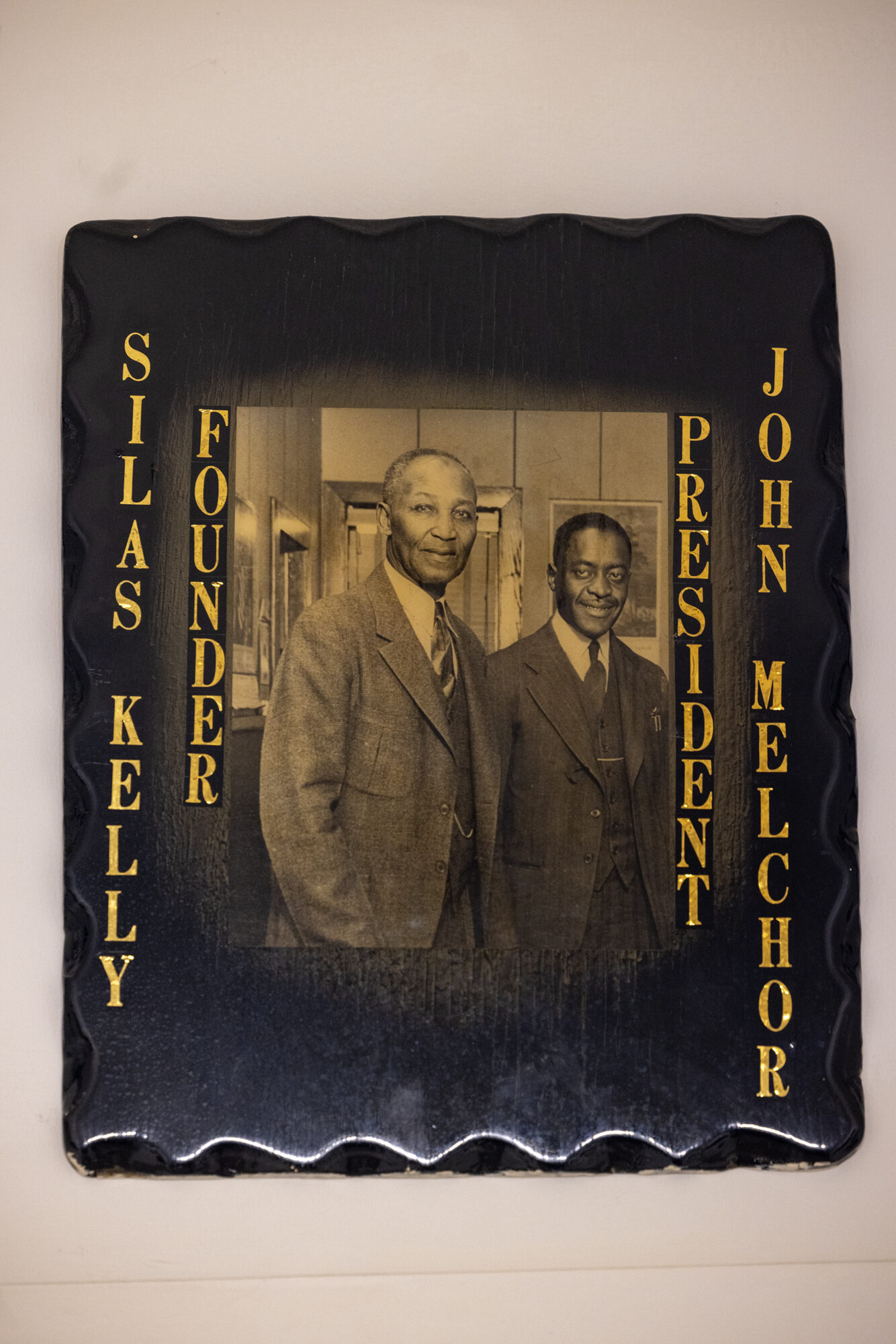
He was fundraising for legal challenges to school segregation cases and cases involving the imprisonment of civil rights activists.
Melchor’s wealth and business success were seen as a threat by his white peers. The Mississippi Sovereignty Commission, a state agency that spied on civil rights activists, kept more than a dozen files on him.
Like other Delta funeral home directors, Melchor’s business suffered as a result of his activism. The Sovereignty Commission connived with local law enforcement to jail his embalmers for operating without a license. While it was standard to leave the license at a business and not in a hearse, law enforcement still fined Melchor and his peers for the misdemeanor when they weren’t at their mortuaries.
Ginise Clement, Melchor’s niece, remembers the family’s first home, which was connected to the morgue and funeral home. She could see from the window in the dining room the caskets lined up. The smell of formaldehyde and embalming fluid would waft through the side door.
She remembers the fear she felt visiting. When she was still a child, Melchor walked her into the morgue to confront her fear.
“You have to be afraid of the live people because those are the ones that can harm you,” Clement remembers John Melchor telling her.
“Sometimes, they would,” she added.
Clement remembers the frequent death threats the family would receive over the telephone. She remembers the strange cars that would follow the family home. She remembers the harassment Melchor’s wife, Ollie Mae, received from administrators at the school where she worked.
“These people were fierce,” Clement said of her aunt and uncle. “I would’ve been scared to death.”
A good day’s work
On Friday evening, mourners departed the funeral home’s chapel for their trucks and cars. The day’s visitation drew to a close. Inside, bouquets of flowers hugged a black casket and colorful lights cast the room in shades of purple.
Shelton Leonard, a 65-year employee with Delta Burial, shut the lid on the casket and wheeled it into a storage room. In another room was the casket with a young woman. Two services were set for the next day.
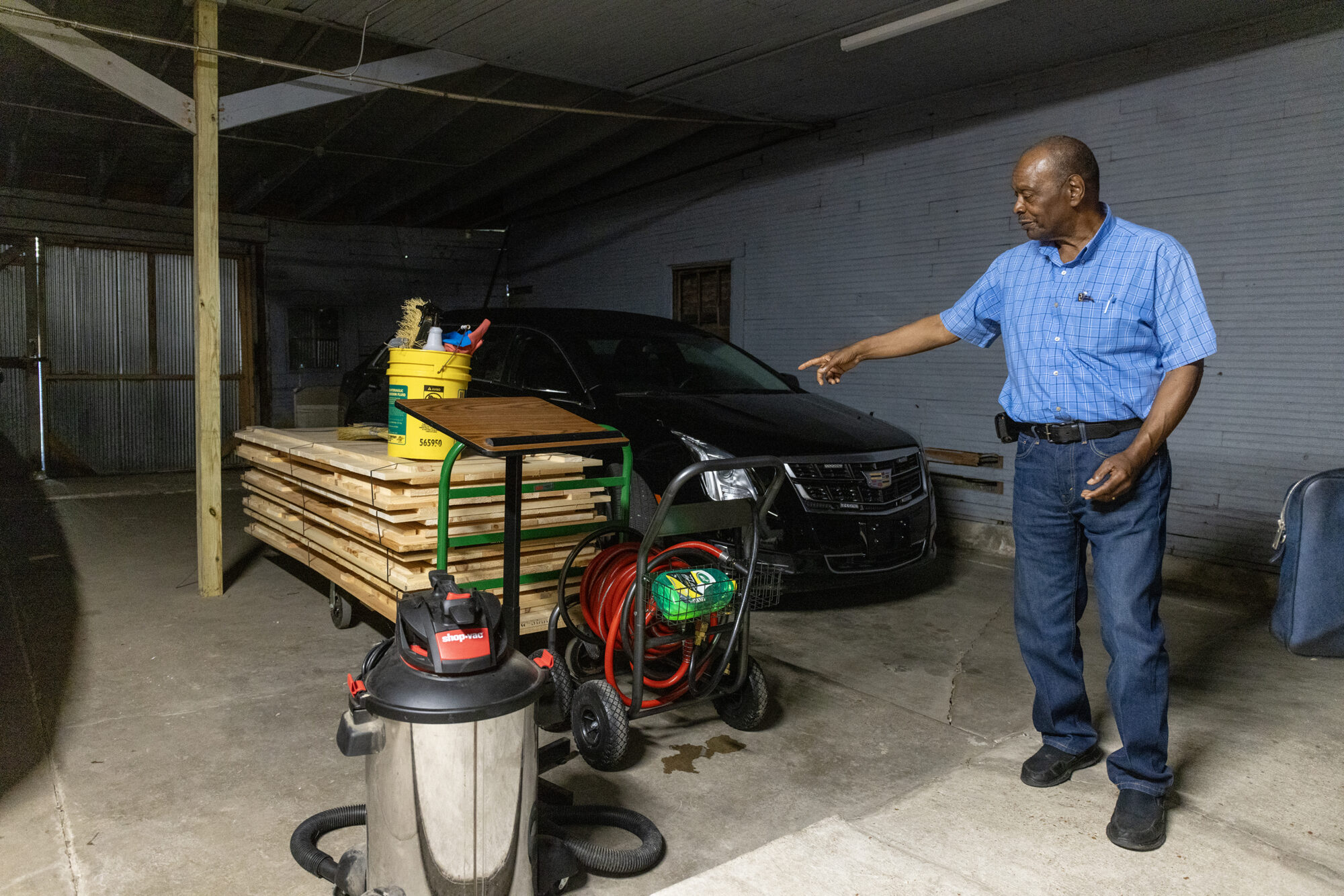
“I go out of my way to provide service for people,” Shelton said. “I think that’s what it’s about: helping people.”
As the sun set on Marks, creating pink and orange streaks in the big Delta sky, a red pickup, an ATV, a golf cart and two more cars pulled up to a corner near the funeral home. Ulysses Hentz and his brother, Phillip, gathered with neighborhood friends.
They shared tributes to Killibrew and Delta Burial. Killibrew was a teacher for 33 years in the county public schools. He has also represented them on the Quitman County Board of Supervisors for 42 years.
For residents of Marks and Quitman County, economic development has been slow. But Delta Burial has stood as a beacon of success.
Most jobs are out of the county. FedEx has three buses that transport locals to work at its warehouse in Memphis. Others work at the prison in Tutwiler or commute to the many businesses in Southaven.
Crenshaw Rubber Factory, an oil meter, a jean manufacturing factory and a garment mill have all closed in recent decades, taking jobs and families with them. The police department has changed locations at least three times in the last 100 years. But Delta Burial has remained in the same location.
“It’s the oldest business in the community. Black or white. It’s a pillar of the community,” said Ulysses Hentz, whose grandfather’s funeral was recently arranged by Delta Burial.
“If you last that many years, a hundred years, in a town like Marks, you got roots in that mud.”
This article first appeared on Mississippi Today and is republished here under a Creative Commons Attribution-NoDerivatives 4.0 International License.
The post Mississippi Delta funeral home marks century of service appeared first on mississippitoday.org
Note: The following A.I. based commentary is not part of the original article, reproduced above, but is offered in the hopes that it will promote greater media literacy and critical thinking, by making any potential bias more visible to the reader –Staff Editor.
Political Bias Rating: Center-Left
This article presents a historically grounded and empathetic narrative focused on the experiences and resilience of a Black-owned funeral home in the Mississippi Delta. The tone and framing highlight systemic racial injustices, economic challenges, and civil rights activism, emphasizing community solidarity and social justice themes. While the article does not explicitly promote a partisan agenda, its emphasis on racial equity and civil rights aligns more closely with center-left perspectives. The coverage remains respectful and fact-based, focusing on history and community impact rather than partisan critique, situating it within a center-left orientation rather than overt activism or partisanship.
Mississippi Today
Rate decision on hold as Wingate tracks down Siemens funds
U.S. District Court Judge Henry Wingate said he’s putting his decision on hold over whether to approve JXN Water’s proposed rate increase until after he finds out what happened with roughly $90 million from a settlement with Siemens.
In 2020, the city of Jackson settled its lawsuit with the German company over years of faulty metering for water services. While about a third of the $90 million went to legal fees, city officials couldn’t immediately say where the rest of those funds went during a status conference Monday.
City Attorney Drew Martin said he was working to comply with a subpoena Wingate issued last week looking for an accounting of the settlement dollars, adding that he would have those details within a day or two. While he couldn’t say for sure where the money went, Martin said the city spent about $50 million within a few months after the settlement, and that there was $8 million remaining as of 2022.
Ted Henifin, who runs JXN Water and first proposed the rate increase in February, said the increase would still be necessary even if the utility received all the money from the Siemens settlement. He said the utility’s day-to-day management is operating at a deficit, and that the $60 million from the settlement — what Jackson received after paying its lawyers — would only cover losses for the next two years.
Henifin added that he’s asking the federal government to move around its funding to the city so he can spend more of it on operations and management. Without a boost to JXN Water’s finances, he said the utility would have to stop paying its contractors.
Wingate inquired about the settlement money during a two-day status conference last month. Henifin told the judge he had no idea what the city did with the funds. Wingate explained Monday that he wanted to make sure he was aware of all possible funding for JXN Water before approving a second rate increase in as many years.
It’s unclear how soon he’ll decide. In addition to Jackson officials, Wingate issued the subpoena on July 9 to the state and federal government as well as four different law firms. The subpoena gives the parties 30 days to produce any information on where the settlement funds went.
The judge also brought up the city’s history with shutting off nonpaying customers. Martin explained that the city, under then Mayor Tony Yarber, agreed to pause shutoffs for customers who had issues with Siemens’ water meters. Jackson prepared to bring back shutoffs in 2019, he said, but put them on hold again during the COVID-19 pandemic.
This article first appeared on Mississippi Today and is republished here under a Creative Commons Attribution-NoDerivatives 4.0 International License.
The post Rate decision on hold as Wingate tracks down Siemens funds appeared first on mississippitoday.org
Note: The following A.I. based commentary is not part of the original article, reproduced above, but is offered in the hopes that it will promote greater media literacy and critical thinking, by making any potential bias more visible to the reader –Staff Editor.
Political Bias Rating: Centrist
This article maintains a factual, neutral tone focused on reporting the status of a legal and financial issue concerning Jackson’s water utility and the Siemens settlement funds. It presents statements from both the judge and city officials without editorializing or taking sides. The language is straightforward and balanced, emphasizing transparency and accountability rather than ideological framing. The article refrains from promoting any political viewpoint and instead centers on the procedural and fiscal aspects of the case, aligning it with neutral, centrist reporting.
Mississippi Today
Donor aids Civil War battlefield in Vicksburg
Vicksburg National Military Park is receiving over $5 million toward restoring a key monument and removing a building that previously was used as a visitors’ center.
Friends of the Vicksburg National Military Park recently announced a $2.8 million private donation to the park by John L. Nau III, a Texas businessman and philanthropist who was a founding board member of the nonprofit Friends organization.
The National Park Service’s Centennial Challenge program will match the donation with $2.5 million in federal funds.
The money will go to restoring the Illinois Memorial and removing an unrelated building that was “erroneously constructed on core battlefield ground — an intrusion that obscures the story and sacrifices of the men who fought and died there in 1863,” according to the Friends.
“Standing on restored battlefield ground gives visitors a chance to truly understand the story of Vicksburg — not just read about it, but feel it,” Bess Averett, executive director of the Friends of Vicksburg National Military Park, said in a press release. “Visitors deserve to walk this hallowed ground and see it as Union and Confederate soldiers saw it during the siege.”
In 1863, Union forces led by Gen. Ulysses S. Grant laid siege to Vicksburg. After 47 days, the Confederate army surrendered, and the defeat turned the tide of the Civil War as the Union gained control of the Mississippi River.
Vicksburg National Military Park was established in 1899 at the battleground. It commemorates the siege and its role in the Civil War, as well as those who fought.
The Illinois Memorial is dedicated to more than 36,000 soldiers from that state who fought in Vicksburg. Both the stone and the inscriptions inside the building have worn down from weather exposure.
In the release, Friends of Vicksburg National Military Park said the park needs both public and private support, as the National Park Service manages over 400 units nationwide.
“We need donors and volunteers now more than ever before,” Averett said.
This article first appeared on Mississippi Today and is republished here under a Creative Commons Attribution-NoDerivatives 4.0 International License.
The post Donor aids Civil War battlefield in Vicksburg appeared first on mississippitoday.org
Note: The following A.I. based commentary is not part of the original article, reproduced above, but is offered in the hopes that it will promote greater media literacy and critical thinking, by making any potential bias more visible to the reader –Staff Editor.
Political Bias Rating: Centrist
This article presents factual reporting on a private donation to Vicksburg National Military Park without evident ideological slant. The piece focuses on the historical significance of the park, the restoration efforts funded by both private and federal sources, and quotes from a nonprofit executive emphasizing the need for support. The language is neutral and informative, avoiding political framing or partisan commentary. It reports on the actions and statements of involved parties without promoting a particular political viewpoint, adhering to balanced coverage of the subject matter.
-
News from the South - Tennessee News Feed4 days ago
Bread sold at Walmart, Kroger stores in TN, KY recalled over undeclared tree nut
-
News from the South - Texas News Feed6 days ago
Why Kerr County balked on a new flood warning system
-
Mississippi Today6 days ago
Hospitals see danger in Medicaid spending cuts
-
News from the South - South Carolina News Feed7 days ago
UN says if US funding for HIV programs is not replaced, millions more will die by 2029
-
News from the South - North Carolina News Feed7 days ago
Cellphone use in schools to be regulated under new NC law
-
News from the South - Arkansas News Feed5 days ago
Man shot and killed in Benton County, near Rogers
-
News from the South - Louisiana News Feed5 days ago
‘Good Trouble’ comes to New Iberia – The Current
-
News from the South - Alabama News Feed4 days ago
Girls Hold Lemonade Stand for St. Jude Hospital | July 12, 2025 | News 19 at 10 p.m. – Weekend















